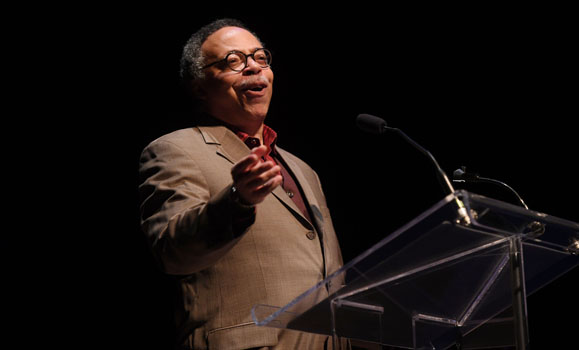Racism
Q&A: George Elliott Clarke on Dalhousie, slavery and reconciliation
'Should the university change its name? I wouldn’t be happy with that'

caption
Clarke, Canada's Poet Laureate, reads an excerpt of his poem at Dalhousie's Bicentennial Launch
caption
Clarke reads an excerpt of his poem at Dalhousie’s Bicentennial LaunchOn Feb. 5, George Elliott Clarke read his poem The Story of Dalhousie at the Dalhousie University bicentennial celebration launch at the Rebecca Cohn Auditorium.
Clarke, 58, grew up in Halifax’s north end. His academic studies took him from Dalhousie to Duke to Harvard and the University of Toronto. He is one of the first African-Nova Scotians to have a PhD.
Clarke reflects on his personal journey and recalls “fighting off the naysayers.”
“I had many people tell me I was no good because I was black, all kinds of naysayers,” said Clarke. “I proved them all wrong, all those people that think black people should be slaves. I put a voice of opposition to those racist, imperialist and pro-slavery ideologies who still exist.” Related stories
Lord Dalhousie, founder of Dalhousie University, was an imperialist with pro-slavery ideologies.
Clarke spoke with The Signal on Feb. 10 about racism, slavery and reconciliation.
What do you think of Lord Dalhousie’s ties to racism and slavery?
This ties into so many attempts ongoing right now to redress historical injustices and address those who were villains, in one way or another. We can go from John A. Macdonald, Edward Cornwallis and so on — down to Richard Nixon and George W. Bush for alleged war crimes. In terms of Lord Dalhousie, he was the product of the British Empire which was a slave-holding empire. The modernization of Europe came from the exploitation of African people and mass indisposition of the Indigenous people of the Americas, and elsewhere around the world. Lord Dalhousie is a part of that history; he was an imperialist, a racist and a slaveholder. You had to believe in white supremacy, that people deserved to own the planet, the resources and exploit all those “inferior people.” It is absurd to point fingers at just at Lord Dalhousie. We could point fingers at various businesses from colonial Nova Scotia and colonial Canada who benefited from slavery. Racism today in Nova Scotia can be traced back to its founding citizens and their ownership of slaves. We are right to chastise and criticize Lord Dalhousie’s views, in a far more scholarly and balanced approach. We have to be judicious in assessing the past, as well as vigorous in promoting redress.
How should Dalhousie University reconcile its past?
Should the university change its name? I wouldn’t be happy with that. I have two degrees with Dalhousie and as far as I know the university itself is not a slave-holding institution. Some of the Harvard folks were involved with slavery, that (in turn) were involved (in) building Harvard. Does that mean Harvard should change its name? How far should one go in terms of attacking symbols of oppression? I think the emphasis should be on how we make life better for black students now at Dalhousie. The idea of removing a statue, a plaque, changing a name may be good things, but they are superficial. What is far more important is changing the attitudes that gave rise to those prejudices and exploitations in the first place.
Your poem follows the history and growth of Dalhousie. Did you find that history relatable to your own journey as a poet and a scholar?
Dalhousie had to overcome major obstacles to become the great institution it is today. The commonality in our stories is an emphasis on being ecumenical, open minded, liberal and not frozen in a stayed position. I hope that’s true for me. I like to think I’m open minded and I think the university started off that way and, of course, ran into great difficulties because of its commitment to being sectarian. Dalhousie’s history is an insurgency in spite of Lord Dalhousie. In spite of Dalhousie’s conservatism they may have had, they have graduated insurgents to go forth and make good change in society and that is the real triumph.
In your poem you talk about fighting off the naysayers, can you explain?
About 10 years ago, I had a fellow walk into my office and tell me that all my work on black Canadian literature doesn’t do anything. He said it doesn’t help any young black man walking down the street in Halifax get a job. I leaned back in my chair and I laughed. I told him I am from North End Halifax, a working class black community; everything I do is a reflection of my roots. And I know publishing my essay in some obscure academic journal is not going to help that poor young man walking down Gottingen Street find a job. But the importance of that scholarship is that after the fact, for all of the folks who have argued for centuries that no young black man should have a job and they are better off as slaves, my scholarship is all about to answer those naysayers. Someone has to answer back in terms of academic research, in terms of the ivory tower, and that man, that naysayer, was the one sitting in my office at the University of Toronto.
This interview has been edited and condensed for clarity

